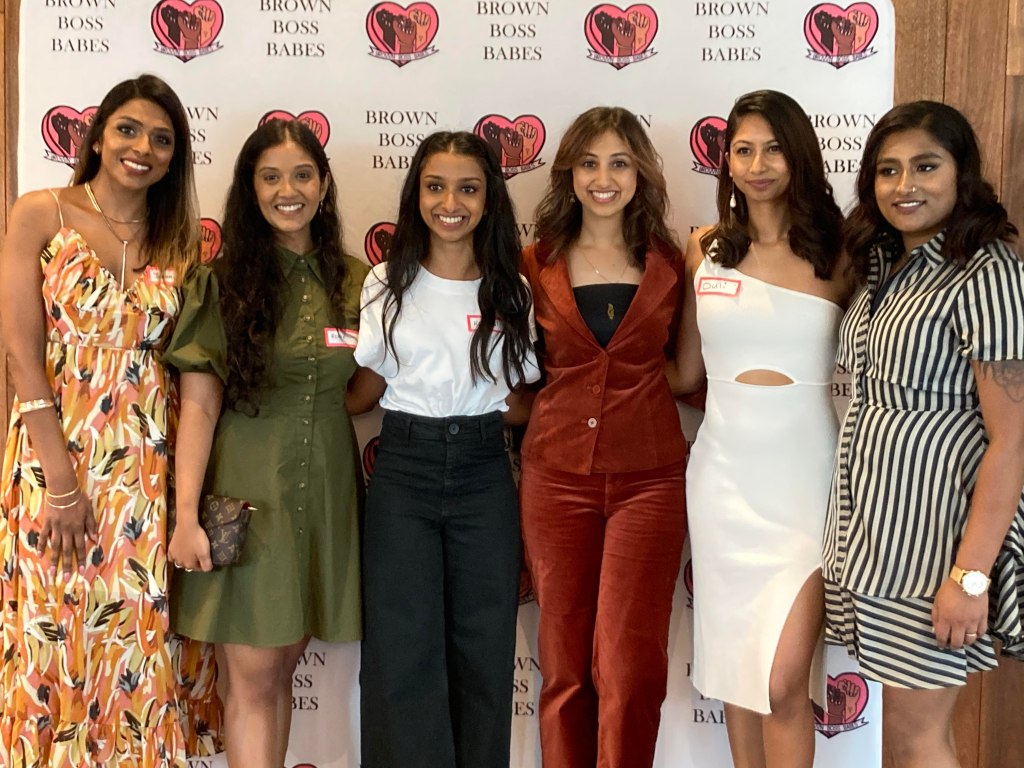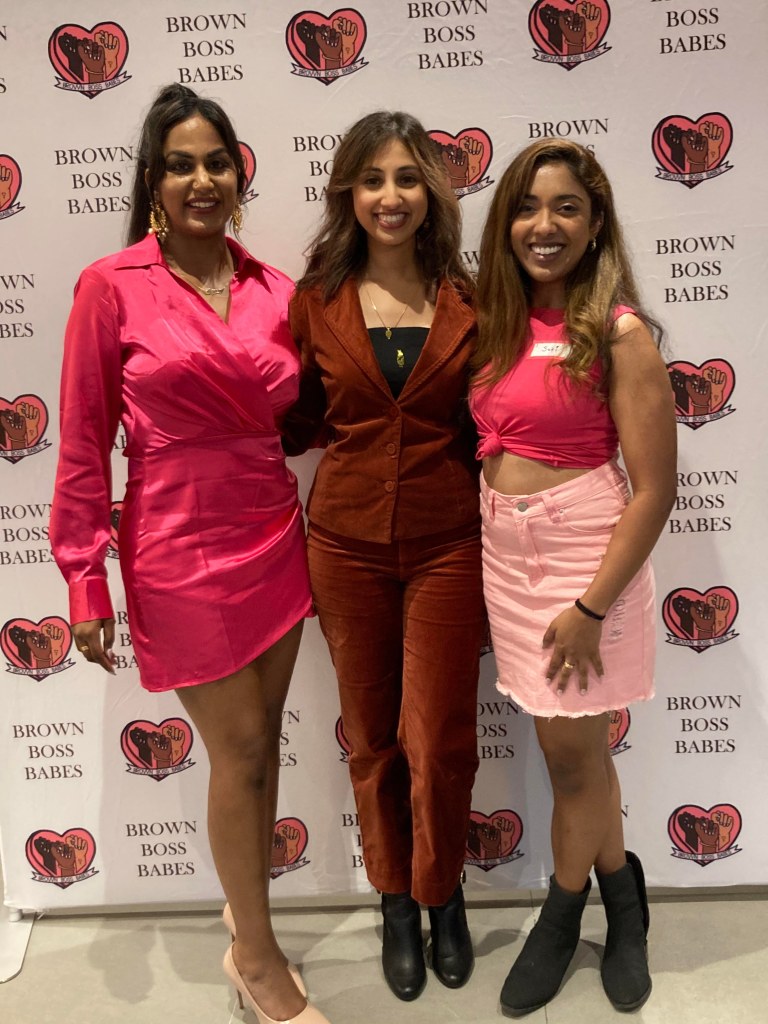Brown Boss Babes (BBB) is an Australian-based organisation that aims to provide a platform to inspire, empower and support South Asian women. On Saturday, March 5, I was invited by BBB to appear as a speaker and panelist at its event in honour of International Women's Day.
Of course, I was in the company of some incredibly inspiring brown women who are fearless leaders in their field, not afraid to speak their truths and help empower others along the way. They were Gather & Stitch founder Helani Sarath-Kumara, advocate against domestic violence, Duli, Get Fit Janani founder Janani Beadle Haran, poet and mental health advocate Pyrawy, and Stuck In Between podcast co-host, Romitha Seher.
Below is my speech from the event, where I share my own experiences of 'breaking the bias' in a professional and personal capacity as a South Asian Australian woman.

This year’s theme for International Women’s Day is ‘Break the bias’. We often hear the phrases, break the glass ceiling, breaking the boundaries, and in my profession as a journalist — breaking news.
But break the bias, in my opinion, captures so many facets of women’s ongoing plight towards gender equality, and I think it’s a phrase that really sings true to the journey we as South Asian women of this generation are embarking on.
Growing up in western Sydney as the daughter of Fijian Indian immigrants, I was all too familiar with community ideals around career — to be a doctor, lawyer, accountant. Some sort of profession that’s deemed professional and socially acceptable.
But the thing is, I was obsessed with Home and Away, High School Musical (spoiler alert, I since went on to interview Zac Efron 3 times in real life), and I tried to get work experience with Hamish & Andy on commercial radio. Here I was, so desperately wanting a media career but knowing at the back of my mind that I wouldn’t be able to make a living from it. But there it was — a bias in my mind. An unconscious bias that had been instilled in me from a young age. "If you don’t have a ‘proper’ job, you won’t be able to survive."
So I studied a bachelor of accounting. I proudly accepted a scholarship degree and at this point I genuinely believed I had picked the right journey for me because I had leaned into that bias.
How did that work out for me? One year into my degree while doing an internship at a chartered accounting firm, I realised no number of corporate lunches with big names in finance were going to alleviate the dread I felt inside.
So, I started a blog in 2011 during my second year of university. It was called I Am Starstruck, which was very fitting for the celeb-crazy 19-year-old I was back then. At the time, blogs were relatively new and I had noticed a gap in the market for Australian-specific entertainment content which was only being covered by one or two big media outlets.
It wasn't before long that my blog’s popularity rose on Twitter. I was being invited to red carpet events and getting exclusives from Australian celebrities. I was the one brown woman on the red carpet. And there we have it, without even realising it, I was breaking the bias.
While my parents saw the success I’d found with my budding blog, they insisted I finish my accounting degree. So I did.
In my spare time I was still blogging, interning for magazines and women’s websites and then instead of taking a graduate job at an accounting firm, I went straight into a Masters of Journalism course while working in retail.
In 2014, I landed my first paid journalism job at Daily Mail Australia, and then went on to become the Entertainment Editor at Yahoo. As my journalism career evolved, so did I as a person. I started to realise that being one of the only brown women at red carpets or in the newsroom came with an opportunity — to elevate our voices and help us feel seen and heard in a media landscape that frankly misrepresents us with bias, or doesn’t represent us at all.
It’s this realisation that’s underpinned my journey over the past few years. Along with roles as editor at HuffPost Australia and my current one as Culture Editor at Refinery29 Australia, I have this blog, Draw Your Box — a space I’m hoping to really focus on this year where more culturally diverse women’s voices are given a platform for their stories to be told.
In this capacity, I’ve found a means to help break the bias in my own way. And if you think about it, it involves helping tell the stories of other women and how they’re breaking the bias.
I’ll give you some examples. I interviewed Maitreyi Ramakrishnan from Mindy Kaling’s Never Have I Ever. She spoke about being proud of her 20-letter name and refusing to anglicise it for the convenience of others so they can pronounce it easily. I recently wrote a piece about the importance of darker-skinned South Asian women being the new female leads in Netflix’s Bridgerton, breaking the whitewashed bias in Hollywood and in South Asia, that fair is lovely and nothing else can surpass these problematic beauty standards.
I’ve been working on a content series at Refinery29 called Fired Up, putting a spotlight on sexual harassment and violence towards women. Today’s event has nominated the Grace Tame Foundation as its charity. Following Australia’s #MeToo or #March4Justice movement over the past year, I’m hopeful more women of colour and South Asian women are supported in breaking the bias and taboo there is around speaking about domestic violence and sexual abuse, and they can come forward to speak about their stories.
What’s really special about today’s event is it’s dedicated to brown women. There are so many of us here in Sydney, but how often do we get a chance to all come together and be in the same room? And so being in this safe space, I feel grateful to have an opportunity to speak about something that perhaps only the brown community will really get and something the brown community needs to hear.
I’ve really struggled in recent years with figuring out who I am as a brown woman. Believe it or not, there is so much bias within the wider south Asian community. There is class, community, language and country of origin that all come into play.
Most people from the South Asian diaspora will tell you that there’s a sharp cultural difference between Indians from Fiji, and Indians from India (or Africa or Malaysia and so on). As a Fijian Indian woman, I’ve struggled to be heard and understood within the wider Indian community, and I’ve questioned where I really fit in within the realm of brown-ess. Am I really an Indian?
I’ve been told I’m not a proper Indian because my parents were born in Fiji, not in India. I’ve been told that I’m not a proper Indian because I’ve never been to India, yet I’ve been to Fiji over 10 times because that’s where the majority of my extended family live after migrating from India back in the 1930s and 1940s. I’ve been told that I’m not a proper Indian because I can’t speak Hindi, but rather Gujarati as that’s the state in India where my ancestors were born.
It’s been a constant identity struggle that I’ve faced — not feeling Australian enough and then not feeling Indian enough either. Then recently married the love of my life, He's Malayali with grandparents from Kerala in India but parents who were born in Malaysia.
And I think to myself, if I’ve already struggled this much, what is it going to be like for my future children? Gujarati, Malayali, Fijian Indian, Malaysian South Indian.
So I think the biggest example of breaking the bias in my personal experience has been breaking it within the South Asian community itself.
Today, I’m thankful you’ve all listened to me. Being invited to be a part of this event, as a Fijian Indian woman on stage, has already helped me in that journey of realising I am enough, and I am just as worthy of having a voice amongst the brown community.
Breaking the bias doesn’t have to be a radical act, in fact you’re doing it right now by being present at this event. Thank you.

